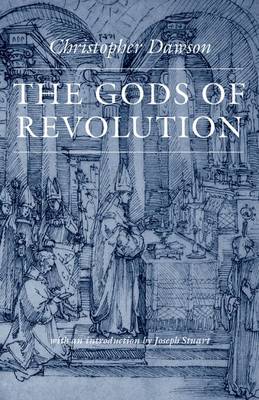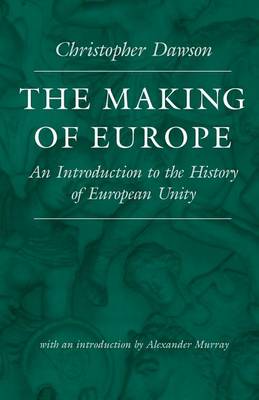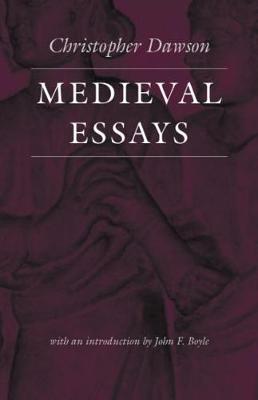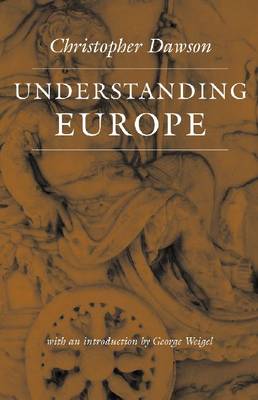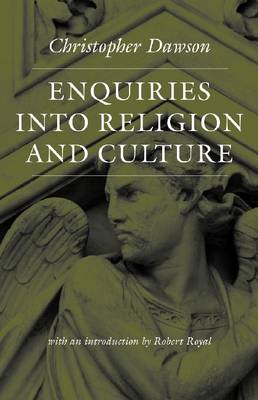Works of Christopher Dawson
5 total works
In The Gods of Revolution, Christopher Dawson brought to bear, as Glanmor Williams said, "his brilliantly perceptive powers of analysis on the French Revolution. . . . In so doing he reversed the trends of recent historiography which has concentrated primarily on examining the social and economic context of that great upheaval."
Dawson underlines the fact that the Revolution was not animated by democratic ideals but rather reflected an authoritarian liberalism often marked by a fundamental contempt for the populace, described by Voltaire as "the `canaille' that is not worthy of enlightenment and which deserves its yoke." The old Christian order had stressed a common faith and common service shared by nobles and peasants alike but Rousseau"pleads the cause of the individual against society, the poor against the rich, and the people against the privileged classes." It is Rousseau whom Dawson describes as the spiritual father of the new age in disclosing a new spirit of revolutionary idealism expressed in liberalism, socialism and anarchism. But the old unity was not replaced by a new form. Dawson insists the whole period following the Revolution is "characterized by a continual struggle between conflicting ideologies," and the periods of relative stabilization such as the Napoleonic restoration, Victorian liberalism in England, and capitalist imperialism in the second German empire "have been compromises or temporary truces between two periods of conquest." This leads to his assertion that "the survival of westernculture demands unity as well as freedom, and the great problem of our time is how these two essentials are to be reconciled."
This reconciliation will require more than technological e"fficiency for "a free society requires a higher degree of spiritual unity than a totalitarian one. Hence the spiritual integration of western culture is essential to its temporal survival." It is to Christianity alone that western culture "must look for leadership and help in restoring the moral and spiritual unity of our civilization," for it alone has the influence, "in ethics, in education, in literature, and in social action" su"ciently strong to achieve this end.
Dawson underlines the fact that the Revolution was not animated by democratic ideals but rather reflected an authoritarian liberalism often marked by a fundamental contempt for the populace, described by Voltaire as "the `canaille' that is not worthy of enlightenment and which deserves its yoke." The old Christian order had stressed a common faith and common service shared by nobles and peasants alike but Rousseau"pleads the cause of the individual against society, the poor against the rich, and the people against the privileged classes." It is Rousseau whom Dawson describes as the spiritual father of the new age in disclosing a new spirit of revolutionary idealism expressed in liberalism, socialism and anarchism. But the old unity was not replaced by a new form. Dawson insists the whole period following the Revolution is "characterized by a continual struggle between conflicting ideologies," and the periods of relative stabilization such as the Napoleonic restoration, Victorian liberalism in England, and capitalist imperialism in the second German empire "have been compromises or temporary truces between two periods of conquest." This leads to his assertion that "the survival of westernculture demands unity as well as freedom, and the great problem of our time is how these two essentials are to be reconciled."
This reconciliation will require more than technological e"fficiency for "a free society requires a higher degree of spiritual unity than a totalitarian one. Hence the spiritual integration of western culture is essential to its temporal survival." It is to Christianity alone that western culture "must look for leadership and help in restoring the moral and spiritual unity of our civilization," for it alone has the influence, "in ethics, in education, in literature, and in social action" su"ciently strong to achieve this end.
In this work, Christopher Dawson concludes that the period of the 4th to the 11th centuries, commonly known as the Dark Ages, was not a barren prelude to the creative energy of the mediaeval world. Instead, he argues that it is better described as ""ages of dawn"", for it was in this rich and confused period that the complex and creative interaction of the Roman Empire, the Christian Church, the classical tradition and barbarous societies provided the foundation for a vital, unified European culture. In an age of fragmentation and the emergence of new nationalist forces, Dawson argued that if ""our civilization is to survive, it is essential that it should develop a common European consciousness and sense of historic and organic unity"". But he was clear that this unity required sources deeper and more complex than the political and economic movements on which so many had come to depend, and he insisted, prophetically, that Europe would need to recover its Christian roots if it was to survive.
A comprehensive collection of essays from the Middle Ages, this text ranges from the fateful days of the late Roman Empire to the final destruction of Byzantium, from the rise of Islam to the flowering of western vernacular literature, from missions to China to the caliphs of Egypt, from the tragedy of Christian Armenia to complex religious realities of Christian, Jewish, and Muslim Spain, from philosophy to literature, theology to natural science.
In a time of remarkable but selective amnesia in the West reflected perhaps most dramatically in the denial of the Christian roots of Europe in the first drafts of the European constitution, ""Understanding Europe"" is as relevant today as it was on its first appearance in 1952. Christopher Dawson wrote of the uneasiness that characterized twentieth-century Western civilization in the aftermath of two disastrous global conflicts and the attempt to build a new secular civilization on impersonal economic forces. He desired a unified Europe, but one unified by a common Christian religion.Recognizing the emphasis on economic utility and mass productivity in European culture, Dawson argued that a renewed study of Christian faith and culture was essential in order to recover the deeper sense of European unity. In ""Understanding Europe"", Dawson expresses a desire for Europe to rediscover and renew its foundational Christian sources in order to recover a deeper sense of integrity.This edition includes an introduction by George Weigel. Other volumes in the Works of Christopher Dawson series include ""The Making of Europe"", ""Medieval Essays"", and ""Progress and Religion"".
The essays presented in this volume are among the most wide-ranging, intellectually rich, and diverse of Christopher Dawson's reflections on the relations of faith and culture. In them, he explores the contact between the spiritual life of the individual and the social and economic organization of modern culture. His focus ranges from the passing of industrialism to the Catholic understanding of the human person, to Islamic mysticism, to a Christian account of sexuality.Dawson argues that modern Western culture is unique in its tendency to ignore its spiritual roots and its once close contact with nature and tradition, and to substitute for them an impersonal economic and materialist organization of mass society. In these essays, he warns against the increasingly secular preoccupations of modern sociological accounts of European culture and insists that they require the supplement and corrective of theology and philosophy. But he is equally insistent on the dangers of a false spiritualism that ignores emerging sociological insights.Widely praised as one of the most important Catholic historians of the twentieth century, Christopher Dawson, in all of his writings, masterfully brings various disciplinary perspectives and historical sources into a complex unity of expression and applies them to concrete conditions of modern society. ""Enquiries into Religion and Culture"" includes an introduction by Robert Royal.
